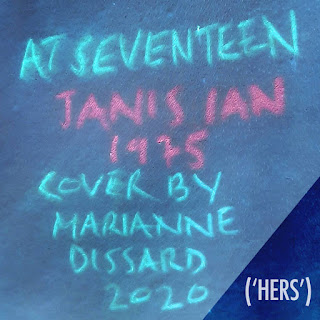Marianne Dissard
You, dear reader, may have noticed that these pages haven't been updated for ** coughs ** a while. However it takes a rather special artist to jolt me from my slumber and to pick up my metaphorical quill once more…
So there I was "social distancing" and once more listening along with The Charlatans' Tim Burgess' #timstwitterlisteningparty and the seminal "Feast of Wire" from Tucson's masters of indie-infused Americana (both the North and Norte varieties), Calexico. I'd idly tweeted my enthusiasm for this work and rounded-off with a comment that the only song I could possibly follow with was their "Ballad of Cable Hogue" from 2000's "Hot Rail" which featured none-other than a certain Marianne Dissard guesting on vocals…
Now I've written about Marianne Dissard previously, waxing-lyrically about 2016's lovingly curated retrospective "Cibola Gold" and while the post does come across as a fan letter, this album really is the ideal jumping-off point into the musical odyssey that is her back-catalogue. And then said Tucson-cum-Ramsgate-based Chanteuse sent me a note regarding her latest release…
So there I was "social distancing" and once more listening along with The Charlatans' Tim Burgess' #timstwitterlisteningparty and the seminal "Feast of Wire" from Tucson's masters of indie-infused Americana (both the North and Norte varieties), Calexico. I'd idly tweeted my enthusiasm for this work and rounded-off with a comment that the only song I could possibly follow with was their "Ballad of Cable Hogue" from 2000's "Hot Rail" which featured none-other than a certain Marianne Dissard guesting on vocals…
Now I've written about Marianne Dissard previously, waxing-lyrically about 2016's lovingly curated retrospective "Cibola Gold" and while the post does come across as a fan letter, this album really is the ideal jumping-off point into the musical odyssey that is her back-catalogue. And then said Tucson-cum-Ramsgate-based Chanteuse sent me a note regarding her latest release…
Marianne' latest record includes "His" and "Hers" version of Janis Ian's classic on-the-surface melancholic teen-confessional "At Seventeen." The "His" version is produced by Ramsgate musician, songwriter and producer Raphael Mann, while "Hers" was overseen by - yes - Marianne.
"Version Homme" is - in the best possible interpretation - a world weary version of the original. Whereas Janis Ian was in her mid-twenties when she wrote this song, so as the protagonist can be seen reflecting upon her still smarting recent past, with Marianne's vocal interpretation we're reflecting upon a traumatic period a lifetime ago - you can feel the weight of history, the disdain, pain and exasperation vividly captured by the vocals.
All is expertly captured in the video which accompanies this version of the song. With its gaudy Technicolor hues, naturally beautiful young girls are masked in bright crimson lipstick, make-up and foundation applied by the trowel. Beaming smiles abound, yet as those lips turn down and the smiles collapse you see the fear and doubt in the eyes… it's all a facade, trying and failing to conform to the norms imposed by society. The video captures all this; "…The rich relationed hometown queen…" indeed hides behind her jewellery and trophy-wife status, afraid that just like her rich, successful husband' car, she could be traded for a newer model. These images, juxtaposed with those of today's phone-totting instagram and TikTok savvy teenagers, shows just how little we have progressed or learnt… However, this being Marianne, there's a twist…
"Version Femme” is same song, different feel - as Marianne describes "fresh and irrelevant" and perfectly encapsulate by the video accompanying this version - the anger and pain has been replaced by a feeling of wry reminiscence of times gone by. This version also captures the essence of Marianne Dissard - chanteuse, autrice-compositrice-interprète - and her interpretation of the uniquely French musical genre, Chanson. Both these versions replace the lilting Bossa-Nova rhythm of the original, taking the song back thirty years before its release date and refocus the song squarely on its lyrics with traditional French chanson-styled vocal interpretation. For all the lushness of the Cello, flute and upright bass, Marianne's voice is the primary instrument. However, while "His" version captures the intimateness of Marianne's European "City-Series" recordings, "Her" version incorporates the musical heritage - folklórico - which straddles the southern border.
Ultimately, "At Seventeen” is a timeless classic with a message as relevant today as it was forty-odd years ago, the endless battle against thee pressure to conform, all the while presenting a veneer of confidence while inside feeling insecure and on the verge of panic and despair... until finally being honest with yourself and forcing others to accept you for what you are and what you can and will be... Which is where Janis Ian comes to the rescue. There's a line buried amongst the song's lyrics; "…And dreams were all they gave for free, To ugly duckling girls like me…" Ugly ducklings always grow-up to be beautiful swans. The line is there deliberately, hidden in plain-sight…
Do I have a favourite version? Now that would be telling…
That being said, the interpretation of folk singer Kath Bloom's 1982 "It's So Hard To Come Home", co-written with Loren Mazzacane and which Marianne recorded in 2006 with Calexico's Joey Burns, is arguably worthy of an article in itself and is a song that has sent me on a voyage of discovery in search of Kath Bloom's music…

Hi Steve! I've followed your blog for some time now and was curious if I could submit my band's new album for consideration. Thanks and hope to talk soon!
ReplyDelete